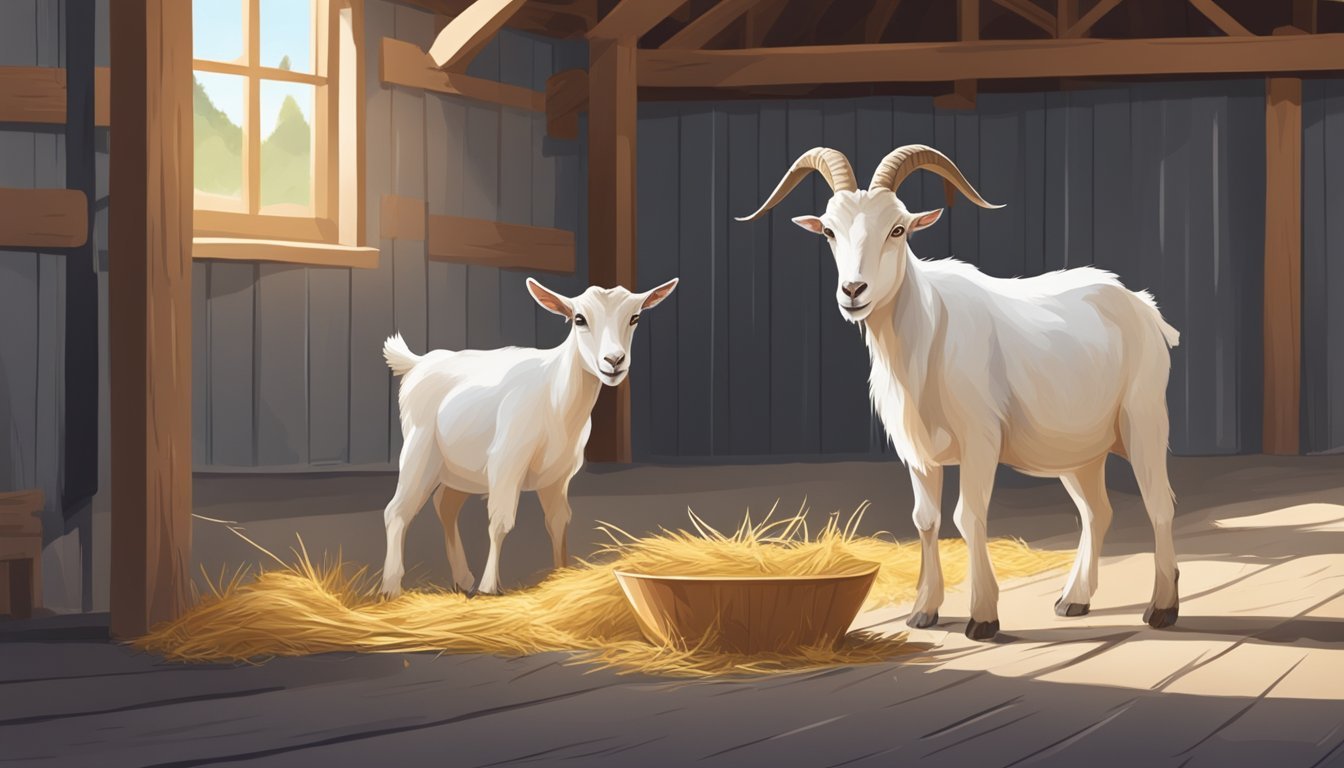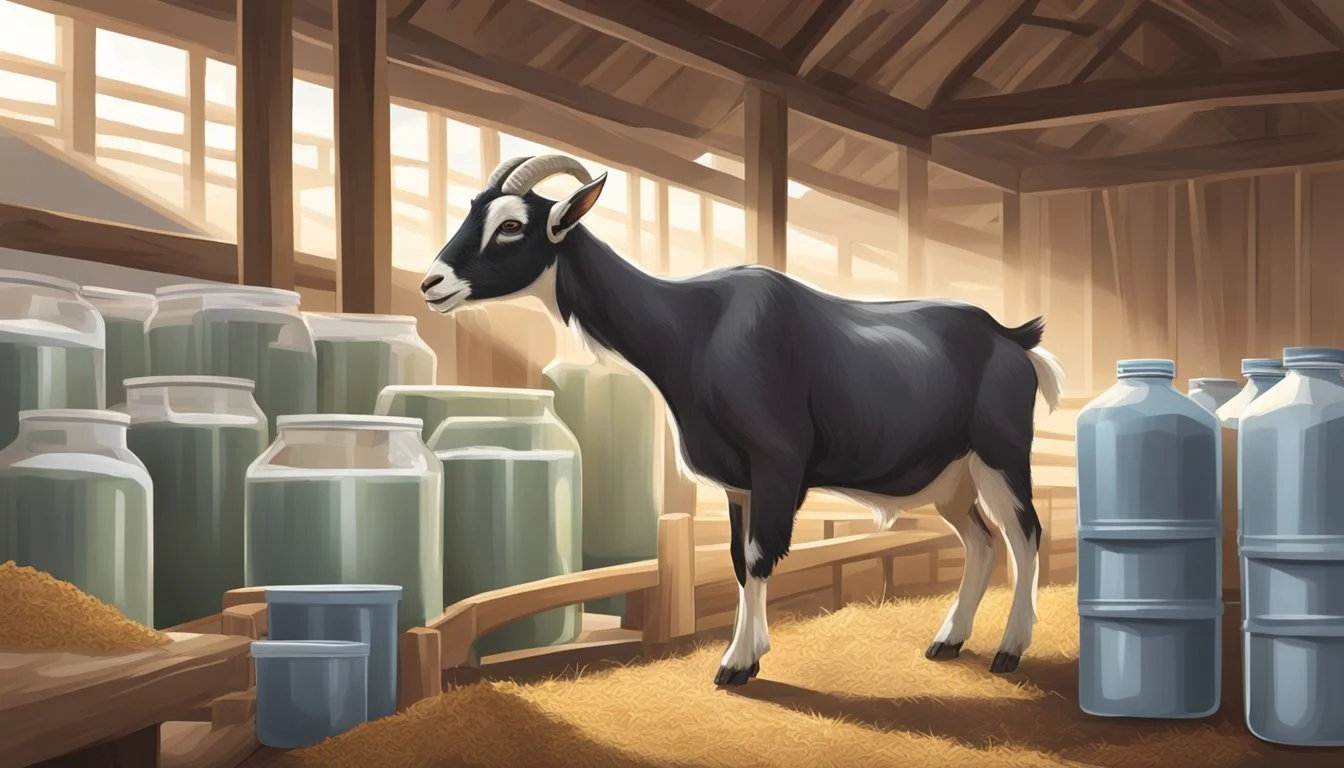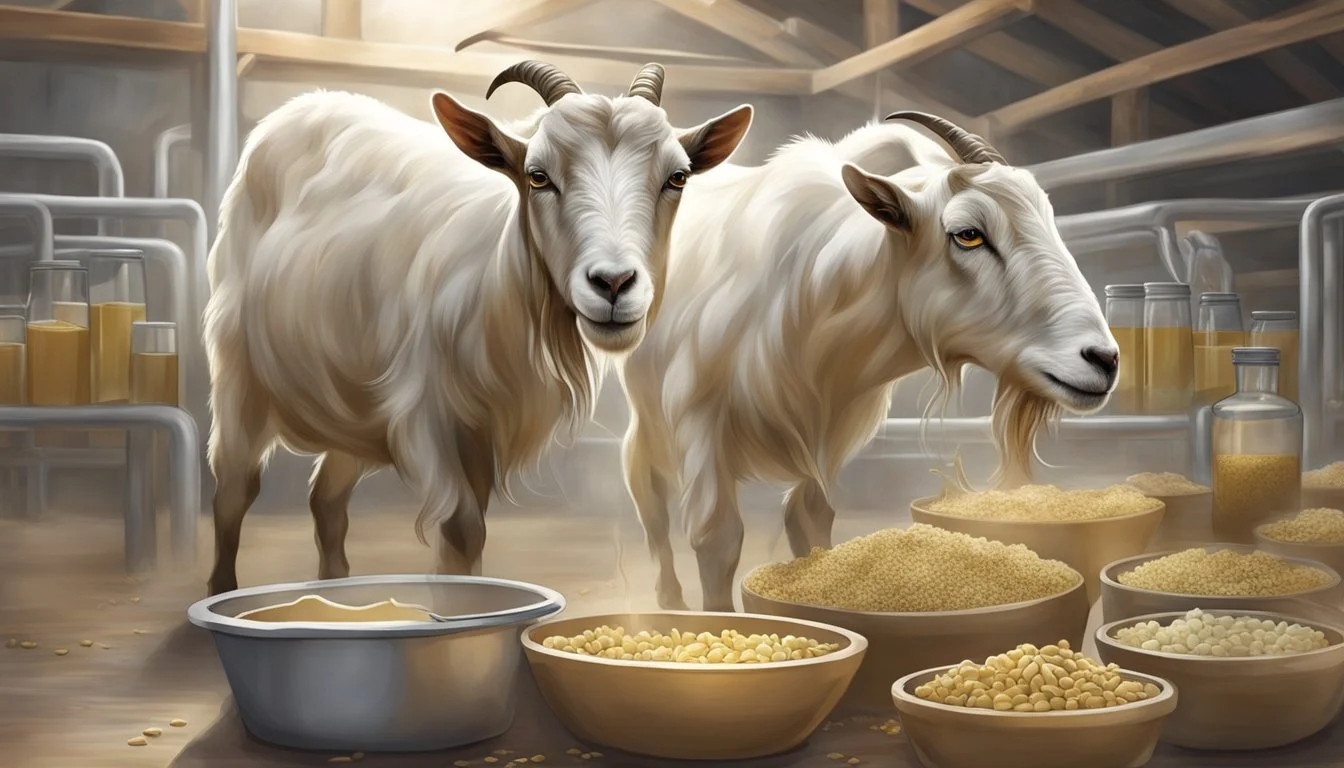The Role of Probiotics in Your Milking Goat's Diet
Enhancing Health and Milk Quality
The inclusion of probiotics in the diet of milking goats has emerged as a critical factor in agricultural practices, particularly in the realm of dairy production. These beneficial microorganisms are recognized for their ability to enhance the overall health and nutrition of goats. By improving gut health, they not only aid in nutrient absorption but also contribute to a stronger immune system. As the quality of goat milk is intrinsically linked to the animals' well-being, a diet supplemented with probiotics can lead to milk with enhanced nutritional properties, containing higher levels of beneficial fatty acids and potentially even probiotic organisms themselves.
Understanding the role of probiotics in goat nutrition is pivotal for dairy farmers aiming to produce high-quality milk. Probiotics are known to play a significant role in modulating the microbiota of the gastrointestinal tract, which in turn affects milk composition. Studies suggest that probiotics in a goat's diet can improve milk yield and the fatty acid profile of the milk, factors that are crucial for the dairy industry. Enhancing the sensory properties of goat milk products, probiotics might also address consumer preferences, thereby facilitating a broader acceptance in the market.
It is clear that probiotics offer a dual benefit to dairy goats: improving their health and potentially increasing the quality of the dairy products derived from their milk. For dairy farmers and consumers alike, the potential advantages of incorporating probiotics into the diets of milking goats are substantial, pointing towards a synergistic relationship between animal health, dairy nutrition, and end-product quality.
Understanding Probiotics
Probiotics play a crucial role in the health and efficiency of a goat's digestive system by providing beneficial bacteria that aid in digestion and gut health.
Probiotic Bacteria and Their Function
Probiotic bacteria, primarily composed of strains such as Bifidobacterium and Lactobacillus, work by colonizing the gastrointestinal tract. These microorganisms facilitate the breakdown of nutrients for better absorption and actively compete with harmful pathogens, enhancing the overall integrity of the gut microbiota. The presence of lactic acid-producing bacteria (LAB) contributes to a balanced pH in the gut, pivotal for an efficient digestive process.
Benefits of Probiotics to the Goat's Gut
Incorporating probiotics into a goat's diet supports a healthy gut by:
Improving the digestion and absorption of nutrients, crucial for a goat's nutrition.
Bolstering the immune system via an enhanced gut barrier.
Positively impacting the overall health and welfare of dairy goats, which may translate to improved dairy production efficiency.
Probiotics vs. Prebiotics
While probiotics are live beneficial bacteria that reside in the gut, prebiotics are fibrous compounds that fuel these probiotic bacteria. They work together harmoniously to maintain a healthy gut environment. An efficient balance between the two is essential for optimal gastrointestinal functionality and health in milking goats.
Nutritional Requirements of Milking Goats
Proper nutrition is crucial for milking goats to ensure optimal milk production and overall health. The diet must meet all their nutritional needs, which includes a balance of essential nutrients and careful attention to feeding practices.
Essential Nutrients in a Goat's Diet
Milking goats require a diet rich in several key nutrients to maintain their health and enhance milk production. Energy is critical and typically provided in the form of carbohydrates and fats. Proteins are necessary for muscle development and repair, while calcium and phosphorus are important for strong bones and teeth, with an ideal calcium to phosphorus ratio between 1:1 and 2:1. Other essential minerals such as magnesium and iron support various bodily functions, including enzyme activation and oxygen transport. Fatty acids are also important for energy and the production of milk fat.
Role of Probiotics in Nutrient Absorption
Probiotics can play a significant role in the diet of milking goats by enhancing nutrient absorption and improving gut health. They assist in maintaining a stable pH level in the goat's rumen, which optimizes the fermentation process and thus, the digestion of feed. This allows goats to extract maximum nutrition from their diet, potentially leading to increased milk yield and improved milk components.
Feeding Practices for Milking Goats
Appropriate feeding practices are essential for supplying milking goats with their nutritional needs. Goats should have access to a diet that includes a variety of feedstuffs to balance their intake of energy, nutrients, and minerals. The regularization of consumption by proper ration formulation and feeding schedule can prevent digestive issues and ensure steady milk production. Nutritional content can be influenced by factors such as the protein content of the goat's diet; goats fed a high-protein diet will produce milk with a higher protein content.
Probiotics and Goat Milk Production
Recent studies indicate that incorporating probiotics into a milking goat's diet can significantly affect the quality and yield of goat milk produced.
Impact on Milk Quality and Yield
The introduction of probiotics into a goat's diet can positively influence the nutritional properties of the milk produced. Probiotics are live microorganisms that can confer a health benefit to the host. In goats, these benefits extend to enhancing the milk's content of beneficial fatty acids and lactic acid, which play a critical role in both the health benefits and sensory properties of dairy products. Research indicates that probiotics can lead to an increase in milk yield, thus potentially improving overall dairy production efficiency.
Enhancing Dairy Product Diversity
The use of probiotics in goat milk not only boosts its nutritional profile but also diversifies the variety of dairy foods. Probiotic-enriched foods are often categorized as functional foods due to their added health benefits. These beneficial microbes can be incorporated into various goat milk products such as cheese, yogurt, and ice cream. The result is a range of dairy products with improved functional properties, such as better digestibility and the potential to support gut health.
Probiotic Fortification in Goat Dairy Products
Fortifying goat dairy products with probiotics enhances their appeal as healthful options for consumers. The capacity for goat milk to serve as a successful delivery vehicle for probiotics, combined with its nutrient-rich profile, positions it well within the functional food market. However, while it's feasible to maintain probiotic viability in goat milk products throughout their shelf life, some products may face challenges relevant to their sensory attributes, such as flavor profiles. Addressing these sensory considerations is key to broadening the appeal of these fortified dairy products.
Health Benefits of Probiotics
The inclusion of probiotics in the diet can significantly bolster health, particularly by enhancing the immune system, mitigating gastrointestinal diseases, and contributing to overall human health.
Immune System Support
Probiotics, especially strains like Lactobacillus and Bifidobacterium, play a crucial role in supporting the immune system. These beneficial bacteria can help strengthen the body's defenses against pathogens. They enhance the integrity of the gut barrier, stimulate the production of natural antibodies, and may even boost immune cells like the IgA-producing cells, T lymphocytes, and natural killer cells.
Probiotics and Gastrointestinal Diseases
The balance of microbiota in the gastrointestinal tract is instrumental in maintaining digestive health. Probiotics such as acidophilus contribute to the equilibrium of gut flora, which can prevent and alleviate various gastrointestinal diseases. Regular consumption of probiotics has been linked to the improvement of conditions like irritable bowel syndrome, inflammatory bowel disease, and the prevention of diarrhea.
Probiotics in Human Health
Beyond the gut, the influence of probiotics extends to various facets of human health. For example, certain probiotics have been associated with managing symptoms of eczema and reducing the frequency of certain allergies and autoimmune diseases. These microorganisms improve health by enhancing the body's nutritional properties, thereby having a broader impact on overall well-being.
Safety and Regulatory Aspects
The inclusion of probiotics in goat milk products requires stringent safety and regulatory compliance to ensure both the efficacy of the probiotic and the safety of the consumer.
Quality Control in Probiotic Products
When it comes to quality control, manufacturers must prioritize the viability and stability of probiotics in goat milk. It is crucial that probiotics maintain high levels of live bacterial cultures, such as Lactobacillus or Bifidobacterium, throughout the product's shelf life. Technological advances in packaging and probiotic carrier systems are instrumental in achieving this, directly affecting the safety and effectiveness of the final product. Appropriate pH levels, buffering capacity, and nutrient content are necessary for maintaining probiotic viability during storage.
Regulations and Standards for Probiotic Use
The regulatory landscape for probiotics involves a complex framework of standards enforced by various governmental and international agencies. These standards govern the safety assessment of probiotic strains, with a history of safe use being a critical factor in the evaluation process. There is a lack of global harmonization, which means manufacturers must navigate different regulations in various regions. However, safety remains a paramount concern and determining the safety of probiotics requires a systematic and thorough approach. Standards also address labeling claims on functional benefits to prevent misleading consumers.
Technological Advances in Probiotic Usage
With the evolution of technology in agriculture, the integration of probiotics into the diet of milking goats has seen significant advancements, particularly in the methods of delivery and enhancement of probiotic viability, which are crucial for maximizing their health benefits.
Probiotic Delivery Mechanisms
Innovations in probiotic delivery have transformed how probiotic bacteria are administered to milking goats. The application of microencapsulation technology is pivotal, as it protects the probiotics during passage through the harsh gastric environment, ensuring they reach the gut. These carriers, often polysaccharide-based, release the bacteria gradually, optimizing their effects. Advances in fermentation processes further support the development of probiotic-enriched feeds, which simplify the process of integrating probiotics into a goat's diet while maintaining the physicochemical characteristics of the feed.
Role of Technology in Enhancing Probiotic Viability
From encapsulation to storage, technology plays a critical role in maintaining probiotic viability. Cold chain technology is essential in preserving the functionality of these microorganisms during storage and transport, thus extending their shelf life. Furthermore, novel packaging solutions that regulate oxygen and moisture levels have emerged, providing an inert environment that fosters extended probiotic survival. These technologies ensure that the probiotic bacteria retain their viability from production to consumption, ultimately enhancing the health of milking goats.
Challenges and Future Perspectives
Incorporating probiotics into a milking goat's diet presents a diverse set of challenges but also opens up numerous avenues for innovation and sustainable practices. Focused research and development are essential to advancing probiotic applications in caprine nutrition, taking into account the delicate balance of environmental impact and market trends.
Current Research and Development
Current studies on probiotic use in goat diet are exploring ways to enhance the health and milk production of goats while assessing the viability of these microorganisms in different environmental conditions. The difficulty lies in identifying which probiotic strains offer the most benefit to the goats' complex rumen ecosystem. Research efforts like those evaluating the control of pathogenic Cronobacter spp. in infants indicate the meticulous nature required in developing effective probiotic solutions.
Sustainability and Environmental Impact
The incorporation of probiotics in agriculture, including goat farming, has the potential to reduce the reliance on antibiotics, leading to a more sustainable approach to animal husbandry. However, the production of probiotics needs to become more cost-effective to minimize the environmental impact. Practitioners are exploring the use of indigenous probiotic strains that require fewer resources, aiming to lower the carbon footprint associated with commercial probiotic production.
Future Trends in Probiotic Usage
Market trends suggest a growing interest in natural and sustainable livestock farming practices. Probiotic applications in milking goats are expected to become more advanced with the integration of technology in the form of precision feeding and microbiome analysis. This, combined with an expanding knowledge base, promises to drive innovation in goat diet formulation. As research progresses, the future of probiotics in goat nutrition looks to align more closely with animal welfare and environmental stewardship.







